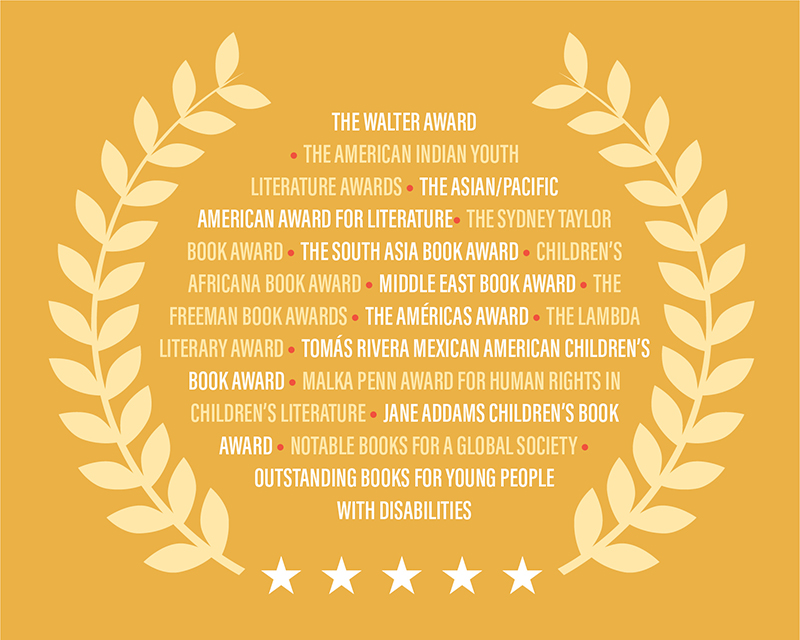Children’s Book Awards that Celebrate Diversity
From the Walter Dean Myers and Sydney Taylor Awards to the Malka Penn Award for Human Rights in Children’s Literature, 11 honors you should know about. Use them to expand your collection and recommend worthy titles to teachers, parents, and young readers.

“So cool to see the Newbery seal on your paperback!” a young librarian declared, when my local library opened its doors again after the first wave of the pandemic.
“Thanks, but The Bridge Home won the Walter Dean Myers Award, actually,” I corrected.
“What’s that?” her eyes grew large with astonishment. Clearly, she’d never heard of the Walter award.
“It’s one of the highest honors that WNDB [We Need Diverse Books] bestows,” I tried to explain. “Think Coretta Scott King, Stonewall, Schneider, and Pura Belpré coming together.”
She looked up the Walter immediately and declared, “It’s only five years old! I can start an entire collection for us!”
Read: “2021 Youth Media Awards Winners”
I was delighted by her enthusiasm, but since then, I’ve realized that this important award isn’t as widely known and appreciated as it ought to be. I’ve been on a mission to highlight it and celebrate past winners wherever I go. I fully respect the immense stress that booksellers, librarians, and teachers are under right now. Given the demands on their time and energy that have only increased during the pandemic, a relatively easy way to include diverse books might be to create displays of WNDB winners and honorees, past and present, every year.
The WNDB Walter award is perhaps one of the most comprehensive in terms of its definition of diversity. In addition to it and the ALA awards mentioned above, here’s a list below of other awards that seek out books about or authors from underrepresented and marginalized groups.
Before mentioning them, however, I must add that awards aren’t everything. Many brilliant books never get the recognition they deserve—and debut authors or the latest additions usually get more buzz than authors who are older and have been contributing excellent work for a long while. Ageism is a real issue. So, if you find a BIPOC author, or author from any other historically under-represented or marginalized community, whose work you love—then showcase it and highlight it whether or not the author has won an award; and follow that author’s career, highlighting backlists.
- The American Indian Youth Literature Awards are presented on a biennial basis by the American Indian Literature Association (which is an affiliate of the American Library Association) to “honor writing and illustrations by and about Native Americans and the Indigenous peoples of North America.”
- The Asian/Pacific American Award for Literature, is bestowed annually by APALA, the Asian/Pacific American Librarians Association to “honor and recognize individual work about Asian/Pacific Americans and their heritage.”
- The Sydney Taylor Book Award is one of the few that showcases our religious diversity. It has been presented annually by the Association of Jewish Libraries since 1968, to encourage “the publication and widespread use of quality Judaic literature.”
- The South Asia Book Award is offered by the South Asia National Outreach Consortium and it seeks to call attention to outstanding works published in the United States as well as around the world that portray South Asians.
- Africa Access and the Outreach Council of the African Studies Association created the Children’s Africana Book Award to “encourage the publication and use of accurate, balanced children’s materials about Africa.” Sister programs include the Middle East Book Award, the Freeman Book Awards, and the Américas Award.
- The Lambda Literary Award, which I have followed since its inception, was created to “garner national visibility for LGBTQ books.”
- The Texas State University College of Education instituted the Tomás Rivera Mexican American Children’s Book Award, which “depicts the Mexican American experience.”
- While the Malka Penn Award for Human Rights in Children’s Literature (relatively new) and Jane Addams Children’s Book Award (relatively well established) honors don’t specifically target diverse books or honor diverse voices alone, both awards are given to books that promote an awareness of social justice and human rights.
- Given my passion for excellent books that portray the disability experience as well as superb global narratives, I also keep an eye out for Notable Books for a Global Society from the International Literacy Association and Outstanding Books for Young People with Disabilities which is created annually by the International Board on Books for Young People.
-
A new award that I’m looking forward to following is the Children and Youth Literary Awards, sponsored by School Library Journal and given by the ALA Black Caucus to “phenomenal works of fiction and nonfiction by Black authors.”
This above list is a subjective collection of my favorites. There are many other excellent lists, created by BIPOC bloggers, for example, to keep on your radar. But if you’re looking to increase the representation of historically under-represented and marginalized voices and stories to your shelves, even just starting a collection of WNDB Walter Award winners, past, present, and future, would be a great step.
Padma Venkatraman is the author of Born Behind Bars, The Bridge Home, A Time to Dance, Island’s End and Climbing the Stairs. Her books have garnered over 20 starred reviews and won numerous awards and honors. Visit her at www.padmavenkatraman.com follow her on twitter (@padmatv) or ig/fb (venkatraman.padma), and keep up with diverse poetry via www.diverseverse.com, an initiative that she started.
RELATED
The job outlook in 2030: Librarians will be in demand
The job outlook in 2030: Librarians will be in demand
ALREADY A SUBSCRIBER? LOG IN
We are currently offering this content for free. Sign up now to activate your personal profile, where you can save articles for future viewing






Add Comment :-
Be the first reader to comment.
Comment Policy:
Comment should not be empty !!!